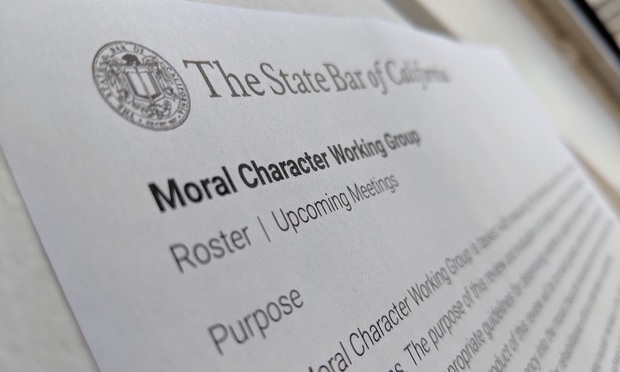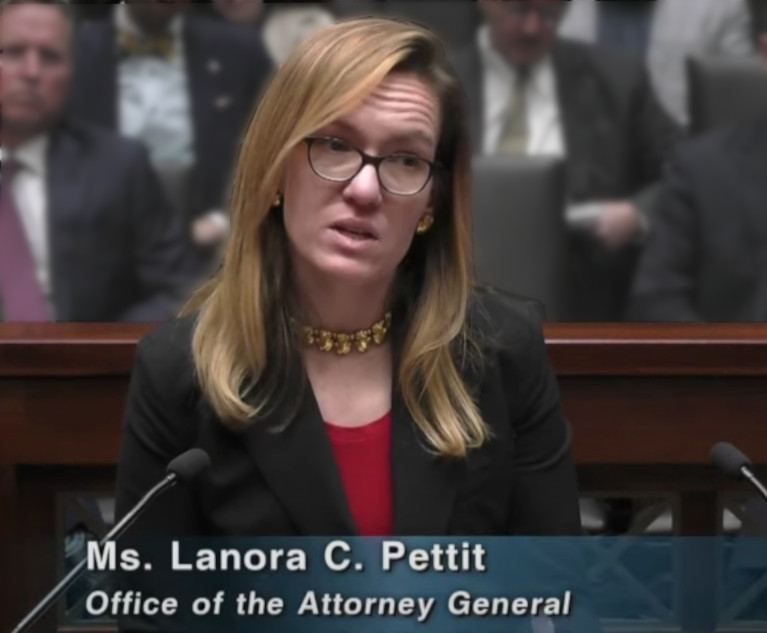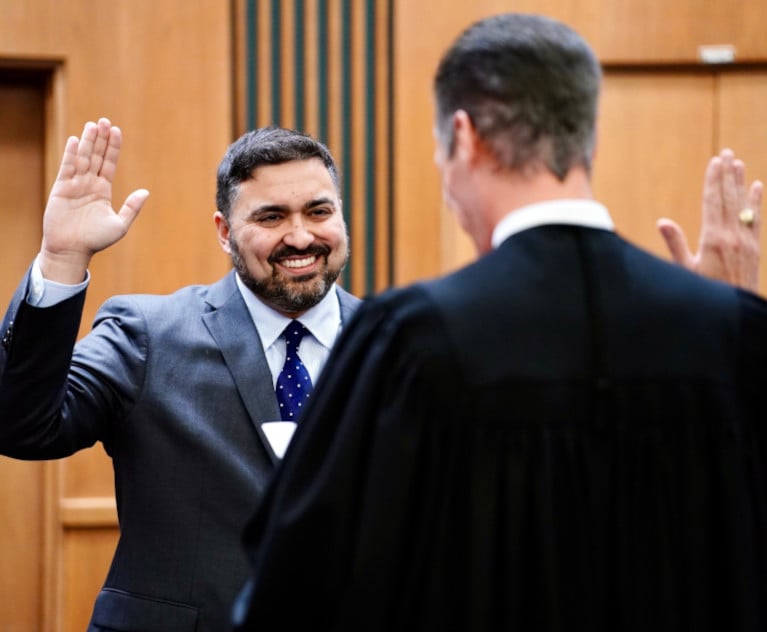New Law Blocks State Bar's Access to Applicants' Mental Health Records
A bar spokeswoman said in June that examiners only request mental health records when “underlying misconduct” raises moral character questions.
July 30, 2019 at 05:46 PM
3 minute read
The original version of this story was published on The Recorder
 A state bar working group is charged with reviewing and possibly revamping how the bar gauges applicants' moral fitness.
A state bar working group is charged with reviewing and possibly revamping how the bar gauges applicants' moral fitness.
The California State Bar will be banned from seeking a would-be lawyer's mental health records as part of its moral character assessment process under legislation signed into law Tuesday by Gov. Gavin Newsom.
The law is aimed at ending the bar's practice of requiring applicants to sign broad waivers allowing the Committee on Bar Examiners to access documents or data related to their medical and mental health.
The legislation's author, Sen. Tom Umberg, D-Santa Ana, cited a 2016 survey of law school students by the American Bar Association that found 42% of respondents said they needed mental health treatment. But only half of those who needed treatment sought it for fear of how that might be perceived by law schools, the bar and future employers, according to the survey.
“There is no reason why perfectly capable people with PTSD or depression, who suffered with those issues, can't practice law and do so effectively,” Umberg said in a statement.
A bar spokeswoman said in June that examiners only request mental health records when “underlying misconduct” raises moral character questions. Bar admissions managers must approve such requests, she said.
How often the bar delves into those records is unclear, but Umberg said he knows of candidates who fear what they might have to divulge about seeking professional help. The new law will stop the bar from asking for those records unless applicants themselves request their review to demonstrate that they are of good moral character or to explain a specific act of misconduct in the past.
The bar did not take a position on the bill.
Read more:
Two California Efforts Could Revamp Attorney 'Moral Character' Review
Law Firms Tackle Mental Health, One Initiative at a Time
Is the Legal Industry Ready for a Culture Shift on Mental Health?
Seeing Lawyers in Crisis, Some Blame the Billable Hour
Confronting the Mental Health Crisis in the Legal Profession
This content has been archived. It is available through our partners, LexisNexis® and Bloomberg Law.
To view this content, please continue to their sites.
Not a Lexis Subscriber?
Subscribe Now
Not a Bloomberg Law Subscriber?
Subscribe Now
NOT FOR REPRINT
© 2025 ALM Global, LLC, All Rights Reserved. Request academic re-use from www.copyright.com. All other uses, submit a request to [email protected]. For more information visit Asset & Logo Licensing.
You Might Like
View All


Trending Stories
- 1Uber Files RICO Suit Against Plaintiff-Side Firms Alleging Fraudulent Injury Claims
- 2The Law Firm Disrupted: Scrutinizing the Elephant More Than the Mouse
- 3Inherent Diminished Value Damages Unavailable to 3rd-Party Claimants, Court Says
- 4Pa. Defense Firm Sued by Client Over Ex-Eagles Player's $43.5M Med Mal Win
- 5Losses Mount at Morris Manning, but Departing Ex-Chair Stays Bullish About His Old Firm's Future
Who Got The Work
J. Brugh Lower of Gibbons has entered an appearance for industrial equipment supplier Devco Corporation in a pending trademark infringement lawsuit. The suit, accusing the defendant of selling knock-off Graco products, was filed Dec. 18 in New Jersey District Court by Rivkin Radler on behalf of Graco Inc. and Graco Minnesota. The case, assigned to U.S. District Judge Zahid N. Quraishi, is 3:24-cv-11294, Graco Inc. et al v. Devco Corporation.
Who Got The Work
Rebecca Maller-Stein and Kent A. Yalowitz of Arnold & Porter Kaye Scholer have entered their appearances for Hanaco Venture Capital and its executives, Lior Prosor and David Frankel, in a pending securities lawsuit. The action, filed on Dec. 24 in New York Southern District Court by Zell, Aron & Co. on behalf of Goldeneye Advisors, accuses the defendants of negligently and fraudulently managing the plaintiff's $1 million investment. The case, assigned to U.S. District Judge Vernon S. Broderick, is 1:24-cv-09918, Goldeneye Advisors, LLC v. Hanaco Venture Capital, Ltd. et al.
Who Got The Work
Attorneys from A&O Shearman has stepped in as defense counsel for Toronto-Dominion Bank and other defendants in a pending securities class action. The suit, filed Dec. 11 in New York Southern District Court by Bleichmar Fonti & Auld, accuses the defendants of concealing the bank's 'pervasive' deficiencies in regards to its compliance with the Bank Secrecy Act and the quality of its anti-money laundering controls. The case, assigned to U.S. District Judge Arun Subramanian, is 1:24-cv-09445, Gonzalez v. The Toronto-Dominion Bank et al.
Who Got The Work
Crown Castle International, a Pennsylvania company providing shared communications infrastructure, has turned to Luke D. Wolf of Gordon Rees Scully Mansukhani to fend off a pending breach-of-contract lawsuit. The court action, filed Nov. 25 in Michigan Eastern District Court by Hooper Hathaway PC on behalf of The Town Residences LLC, accuses Crown Castle of failing to transfer approximately $30,000 in utility payments from T-Mobile in breach of a roof-top lease and assignment agreement. The case, assigned to U.S. District Judge Susan K. Declercq, is 2:24-cv-13131, The Town Residences LLC v. T-Mobile US, Inc. et al.
Who Got The Work
Wilfred P. Coronato and Daniel M. Schwartz of McCarter & English have stepped in as defense counsel to Electrolux Home Products Inc. in a pending product liability lawsuit. The court action, filed Nov. 26 in New York Eastern District Court by Poulos Lopiccolo PC and Nagel Rice LLP on behalf of David Stern, alleges that the defendant's refrigerators’ drawers and shelving repeatedly break and fall apart within months after purchase. The case, assigned to U.S. District Judge Joan M. Azrack, is 2:24-cv-08204, Stern v. Electrolux Home Products, Inc.
Featured Firms
Law Offices of Gary Martin Hays & Associates, P.C.
(470) 294-1674
Law Offices of Mark E. Salomone
(857) 444-6468
Smith & Hassler
(713) 739-1250









